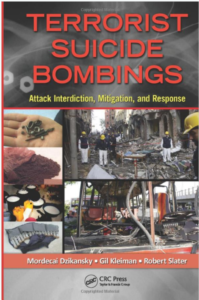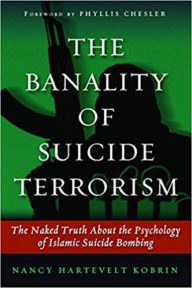Video (above): In The ABCs of Staying Safe on New Year’s Eve, former NYPD detective Mordecai Dzikansky provides security tips on Fox News (Dec. 30, 2016).
Morrow Jensen Reviews “Terrorist Suicide Bombings: Attack Interdiction, Mitigation, and Response” by Mordecai Dzikansky, Gil Kleinman & Robert Slater…
By Amanda C. Morrow Jensen
Henley-Putnam University
Source: The following book review first appeared in Journal of Strategic Security (Vol. 5, No. 2, Art. 3, pp. 119-120), Summer 2012.
Terrorist Suicide Bombings: Attack Interdiction, Mitigation, and Response. By Mordecai Dzikansky, Gil Kleiman, and Robert Slater. Boca Raton, FL: CRC Press, 2012. Amanda C. Morrow Jensen Henley-Putnam University
 This comprehensive guide is both manual and textbook, blending international relations, Middle Eastern history, and psychology into a practical analysis of the authors’ several decades of first-hand counterterrorism experiences responding to and interdicting suicide bombings. Mordecai Dzikansky and Gil Kleiman—aided by the writing skills of Robert Slater— write from their perspectives as law enforcement officers with significant experience in Israeli counterterror operations, bridging a gap in U.S. law enforcement and intelligence culture through the uniqueness of their personal service and heritage. In this capacity, Terrorist Suicide Bombings serves a valuable role in bringing practical counterterrorist advice and tactics directly into the reality of the law enforcement world, which often operates under more stringent rules of engagement and without the technical advantages of federal, military, and international forces. Dzikansky and Kleiman naturally understand the limitations and concerns unique to the law enforcement officer’s perspective on the counterterror fight, and their advice fits directly into that reality. Therein lies the great strength and practical utility of this book.
This comprehensive guide is both manual and textbook, blending international relations, Middle Eastern history, and psychology into a practical analysis of the authors’ several decades of first-hand counterterrorism experiences responding to and interdicting suicide bombings. Mordecai Dzikansky and Gil Kleiman—aided by the writing skills of Robert Slater— write from their perspectives as law enforcement officers with significant experience in Israeli counterterror operations, bridging a gap in U.S. law enforcement and intelligence culture through the uniqueness of their personal service and heritage. In this capacity, Terrorist Suicide Bombings serves a valuable role in bringing practical counterterrorist advice and tactics directly into the reality of the law enforcement world, which often operates under more stringent rules of engagement and without the technical advantages of federal, military, and international forces. Dzikansky and Kleiman naturally understand the limitations and concerns unique to the law enforcement officer’s perspective on the counterterror fight, and their advice fits directly into that reality. Therein lies the great strength and practical utility of this book.
ALSO READ ADINA KUTNICKI’S BOOK REVIEW: Terrorist Cop by Detective Mordecai Dzikansky and Robert Slater!
In writing a text such as this, the authors face the challenge of tackling a topic as large as terrorism for an audience with various levels of knowledge about it. In Sections One and Two, Dzikansky, Kleiman, and Slater do an excellent job of parsing this enormous topic down to succinct, unbiased discussions of terrorism and terrorist profiling. For law enforcement agencies seeking to educate without overwhelming, these two sections do an admirable job of getting the point across without getting lost in the noise and debate surrounding this issue. Section Three offers an equally impartial breakdown of what exactly happens before, during, and after suicide bombings, from both the perspective of the sponsoring terrorist organizations and that of the law enforcement professional tasked with dealing with the fallout.
The heart of the book and its major contribution to the field lies in Sections Four and Five, where Dzikansky, Kleiman, and Slater lay out their lessons learned both for preventing terrorist suicide bombings and for mitigating their impact when they do occur. From practical advice on dealing with the media to honest accounts of the psychological impact of this line of work on first responders, these chapters give professionals a well-grounded checklist for how to efficiently and effectively investigate the scene, keep personnel healthy and safe, and limit the psychological damage the bombing has on the public. The “lessons learned” in Chapter 21 distill the text to nine approaches law enforcement personnel throughout the United States can implement now in order to prepare for and prevent domestic suicide bombings. There is no looking for the bottom line in this book: it is designed to help others succeed, find answers, and create reasonable plans within the constraints of personnel and budget limitations.
READ FELICE FRIEDSON’S INTERVIEW: Mordecai Dzikansky — “TERRORIST COP”
If Terrorist Suicide Bombings has any weakness, it is its failure to acknowledge that terrorism is starting to show signs of morphing and changing in ways that will take it outside the Palestinian model. Two trends, in particular, will have an increasing impact on law enforcement officers throughout the United States. The first is the increase in terrorist activity in Latin America, particularly in the areas of trade-based laundering and crossings on the U.S.-Mexican border. The second trend of note is the increasing propensity of lone-wolf attackers who are not Islamic terrorists to act against political, social, and economic targets inside the United States. The majority of the lone-wolf attacks in the United States do not fit any of the suicide-bombing profiles mentioned in this book, yet, as in the case of Jared Loughner or the Columbine High School shootings, they often inflict as much damage. Although Terrorist Suicide Bombings has several chapters that can be taken as relating to these additional problems, it would be useful to see those connections made more explicit, if only to acknowledge how the expertise of Dzikansky, Kleiman, and Slater fits into the larger counterterror picture, and where we still need others with expertise in these emerging areas of conflict to step up and offer the same level of practical, useful advice and analysis.
READ MORDECAI DZIKANSKY’S POLICY PAPER: THE PHENOMENON OF SUICIDE BOMBINGS IN ISRAEL







